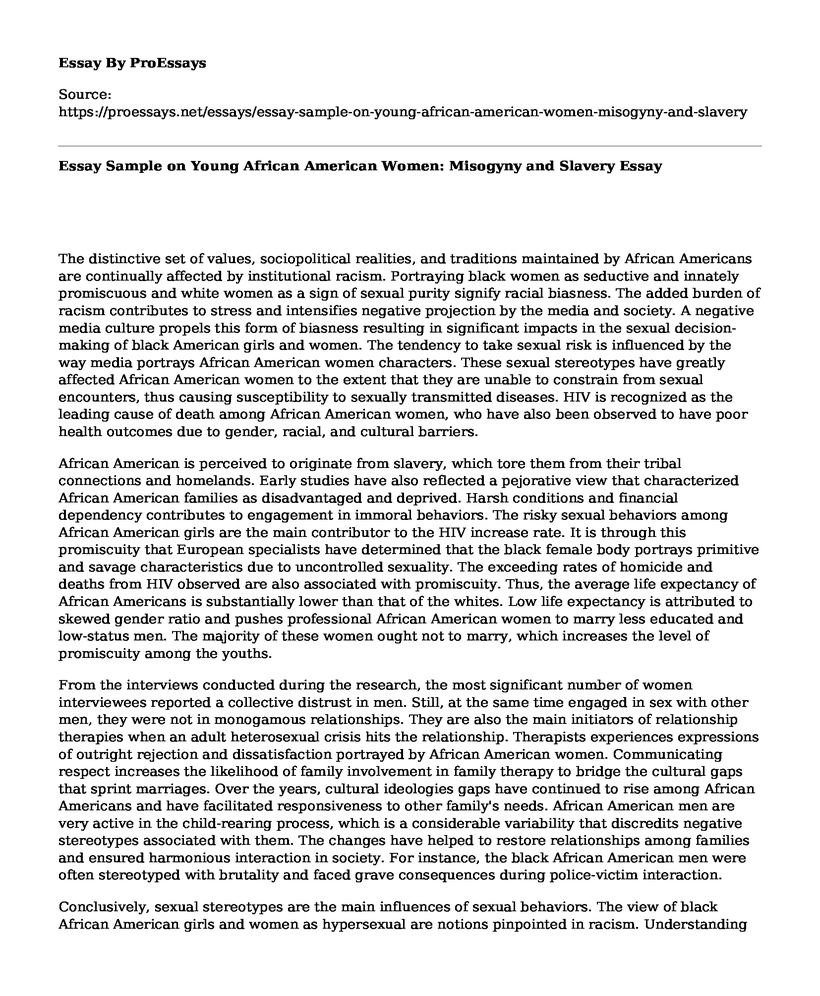The distinctive set of values, sociopolitical realities, and traditions maintained by African Americans are continually affected by institutional racism. Portraying black women as seductive and innately promiscuous and white women as a sign of sexual purity signify racial biasness. The added burden of racism contributes to stress and intensifies negative projection by the media and society. A negative media culture propels this form of biasness resulting in significant impacts in the sexual decision-making of black American girls and women. The tendency to take sexual risk is influenced by the way media portrays African American women characters. These sexual stereotypes have greatly affected African American women to the extent that they are unable to constrain from sexual encounters, thus causing susceptibility to sexually transmitted diseases. HIV is recognized as the leading cause of death among African American women, who have also been observed to have poor health outcomes due to gender, racial, and cultural barriers.
African American is perceived to originate from slavery, which tore them from their tribal connections and homelands. Early studies have also reflected a pejorative view that characterized African American families as disadvantaged and deprived. Harsh conditions and financial dependency contributes to engagement in immoral behaviors. The risky sexual behaviors among African American girls are the main contributor to the HIV increase rate. It is through this promiscuity that European specialists have determined that the black female body portrays primitive and savage characteristics due to uncontrolled sexuality. The exceeding rates of homicide and deaths from HIV observed are also associated with promiscuity. Thus, the average life expectancy of African Americans is substantially lower than that of the whites. Low life expectancy is attributed to skewed gender ratio and pushes professional African American women to marry less educated and low-status men. The majority of these women ought not to marry, which increases the level of promiscuity among the youths.
From the interviews conducted during the research, the most significant number of women interviewees reported a collective distrust in men. Still, at the same time engaged in sex with other men, they were not in monogamous relationships. They are also the main initiators of relationship therapies when an adult heterosexual crisis hits the relationship. Therapists experiences expressions of outright rejection and dissatisfaction portrayed by African American women. Communicating respect increases the likelihood of family involvement in family therapy to bridge the cultural gaps that sprint marriages. Over the years, cultural ideologies gaps have continued to rise among African Americans and have facilitated responsiveness to other family's needs. African American men are very active in the child-rearing process, which is a considerable variability that discredits negative stereotypes associated with them. The changes have helped to restore relationships among families and ensured harmonious interaction in society. For instance, the black African American men were often stereotyped with brutality and faced grave consequences during police-victim interaction.
Conclusively, sexual stereotypes are the main influences of sexual behaviors. The view of black African American girls and women as hypersexual are notions pinpointed in racism. Understanding the originality, the culture, and the belief about black women's sexuality advancement can help to protect the female from sexual violence. Most of the imagery, such as slaveholders, ultimately sought to legitimize the accusations of African slavery. Therefore, emphasis on empowerment is essential to improve the effectiveness and the rationality in sexual decision-making. Empowerment intervention can increase self-esteem among black American women and help to minimize sexual behaviors. These empowerments can be emphasized through the use of public health mentors to create both gender-specific and sensitive interventions based on African American culture. Components such as videos and music can be used to teach positive relationships. Struggles and lessons from sexual stereotypes should also be included to improve gender and culture relevance in programs. The interventions should also include an ethnicity-specific component that proves that objectification also occurs outside the parameters of conscious thoughts.
Bibliography
Davis, Sarita, and Aisha Tucker-Brown. "Effects of black sexual stereotypes on sexual decision making among African American women." Journal of Pan African Studies 5, no. 9 (2013): 111-128.
McGoldrick, Monica, Joseph Giordano, and Nydia Garcia-Preto, eds. Ethnicity and family therapy. Guilford Press, 2005.
Cite this page
Essay Sample on Young African American Women: Misogyny and Slavery. (2023, May 07). Retrieved from https://proessays.net/essays/essay-sample-on-young-african-american-women-misogyny-and-slavery
If you are the original author of this essay and no longer wish to have it published on the ProEssays website, please click below to request its removal:
- Do Violent Video Games Cause Aggression and Violent Behavior? - Essay Sample
- Critical Essay on Gladiator: Wrong Details in the Film
- Immigrants and Their Struggles Essay Example
- Essay on Sexual Assault in England and Wales: Worrying Reduction in Reported Cases
- Essay on Dunkirk: 400,000 Soldiers Trapped, Hope Evaporates
- Essay Example on the Lives of Marcus Garvey and Martin Luther King
- Essay Example on Thomas Jefferson: Founding Father of Revolutionary Age in America







